Freedom of the press in Myanmar refers to the freedom of speech, expression, right to information, and mass media in particular. The media of Myanmar is regulated by the law of Myanmar, the News Media Law which prevent spreading or circulating media bias. It also determines freedom of expression for media houses, journalists, and other individuals or organisations working within the country. Its print, broadcast and Internet media is regulated under the News Media Law, nominally compiled by the International Covenant on Civil and Political Rights and international standards on freedom of expression. [1]
The law of Myanmar compiled by the constitution, prohibits publishing fake news through online or offline such as social, mass media, or otherwise newspaper and could lead to imprisonment of a journalist, newspaper ban or may be fined Ks 100,000 to the maximum of 300,000 kyats if found guilty in such offensive activities. However, media is free to express their views, share options, and criticize government policies under Article 9. [2] [3]
Myanmar's global ranking was improved since National League for Democracy came into power. From 2013 to 2017, it reached to rank 20 in the Press Freedom Index. However, the rank declined after Reuters journalists such as Wa Lone and Kyaw Soe Oo were arrested in 2017 for their investigation into Inn Din massacre. In 2020, its declined to 139 out of 180 in the World Press Freedom Index, a report published by the Reporters Without Borders. [4]
Another reason for press decline are; frequent arrests of journalists, internet shutdown and blocking websites associated with the press or human rights defenders. [5]
The government of Aung San Suu Kyi has been engaged in self-censorship, particularly on three subjects such as Rohingyas, Buddhist religion and Aung San Suu Kyi, which often leads detentions (self-censorship on journalism) if violated or otherwise criticised by the press. Some media publishing houses such as Mawkun magazine, Myanmar Now , DVB, Mizzima News , and BBC Burmese have stopped publishing investigative reports. In Myanmar, private journalists are often prosecuted under article 66 (d) of the Telecommunications Act, which has been enacted to prevent online defamation. The state-owned media has been engaged in propaganda which often publish news to the general public in favour of government. In some areas such as West, has minimum access to news and other information available online since the military have disconnected the Internet in several districts on for alleged security reasons. [4]
Journalists' detentions was criticised by Thant Myint-U, a Burmese historian citing "a tragic day for media freedom and an intimation of what’s to come." [6]
In 2013 the government of Myanmar enacted the Telecommunications Law (section 66D), which has been a subject of arguments since it was enforced. Any person may be convinced for the maximum of three years under 66D section of Telecommunications Law. According to a non-government organisation, PEN Myanmar, 80 cases have been registered since the law enforced; however, 73 persons or media groups have been charged under 66D since Suu Kyi's government came to power in 2016. Some of the cases have been filed for making controversial comments about Suu Kyi and were subsequently prosecuted. [7]
Burmese media was previously restricted from publishing news without approval from censorship team of Myanmar government, which was originally created during the British rule. In earlier period, Burmese government practiced direct censorship. However, in 2012 the government lifted the ban which now allows media publish news without submitting it to censorship team. Every news story, song, book, and cartoon used to required approval by team aimed at to remove "criticism". [8]
In March 2021, Aung Thura, a BBC Burmese service reporter, was arrested by the local authorities while covering the 2021 anti-coup protests against the military. He was held for several days. The BBC claims that Forty journalists have been arrested since the civilian government was overthrown on 1 February 2021. [9]

Aung San Suu Kyi is a Burmese politician, diplomat, author, and a 1991 Nobel Peace Prize laureate who served as State Counsellor of Myanmar and Minister of Foreign Affairs from 2016 to 2021. She has served as the chairperson of the National League for Democracy (NLD) since 2011, having been the general secretary from 1988 to 2011. She played a vital role in Myanmar's transition from military junta to partial democracy in the 2010s.

Myanmar, officially the Republic of the Union of Myanmar, also called Burma, is a country in Southeast Asia. It is the largest country in Mainland Southeast Asia, and has a population of about 54 million as of 2017. Myanmar is bordered by Bangladesh and India to its northwest, China to its northeast, Laos and Thailand to its east and southeast, and the Andaman Sea and the Bay of Bengal to its south and southwest. The country's capital city is Naypyidaw, and its largest city is Yangon (Rangoon).

Myanmar operates de jure as a unitary assembly-independent republic under its 2008 constitution. On 1 February 2021, Myanmar's military took over the government in a coup. Anti-coup protests are ongoing as of 24 February 2021.
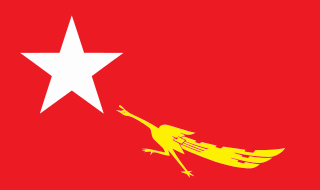
The National League for Democracy is a liberal democratic political party in Myanmar (Burma). It became the country's ruling party after a landslide victory in the 2015 general election but was overthrown in a military coup d'état in early 2021 following another landslide election victory in 2020.

The Irrawaddy is a news website by the Irrawaddy Publishing Group (IPG), founded in 1990 by Burmese exiles living in Thailand. From its inception, The Irrawaddy has taken an independent stance on Burmese politics. As a publication produced by former Burmese activists who fled violent crackdowns on anti-military protests in 1988, it has always been closely associated with the pro-democracy movement, although it remains unaffiliated with any of the political groups that have emerged since the 8888 Uprising.

Paw Oo Tun ; better known by his alias Min Ko Naing, is a leading democracy activist and dissident from Myanmar. He has spent most of the years since 1988 imprisoned by the state for his opposition activities. The New York Times has described him as Burma's "most influential opposition figure after Daw Aung San Suu Kyi".

The Internet in Myanmar has been available since 2000 when the first Internet connections were established. Beginning in September 2011, historically-pervasive levels of Internet censorship in Burma were significantly reduced. Prior to September 2011, the military government worked aggressively to limit and control Internet access through software-based censorship, infrastructure and technical constraints, and laws and regulations with large fines and lengthy prison sentences for violators. In 2015, internet usage significantly increased to 12.6% with the introduction of faster mobile 3G internet by transnational telecommunication companies Telenor Myanmar and Ooredoo Myanmar, later joined by national Myanmar Post and Telecommunications (MPT). While the Internet situation in Myanmar has undergone change since its introduction in 2010 and reduction of censorship in 2011, laws such as the 2013 Telecommunications Law continue to restrict citizens from total freedom online. Despite restrictions, internet penetration continues to grow across the country.
Censorship in Myanmar results from government policies in controlling and regulating certain information, particularly on religious, ethnic, political, and moral grounds.
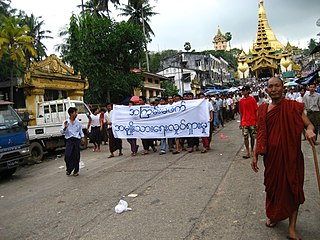
The Saffron Revolution was a series of economic and political protests and demonstrations that took place during August, September, and October 2007 in Myanmar. The protests were triggered by the decision of the national military government to remove subsidies on the sales prices of fuel. The national government is the only supplier of fuels and the removal of the price subsidy immediately caused diesel and petrol prices to increase by 66–100% and the price of compressed natural gas for buses to increase 500% in less than a week.
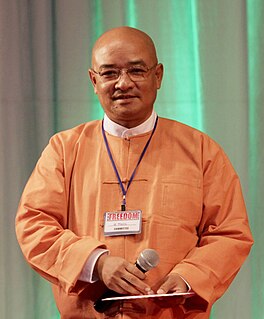
Maung Thura "Zarganar" is a popular Burmese comedian, film actor, and a film director as well as a fierce critic and often political prisoner of the Burmese military government. Known for his wicked puns against the government which is a military junta, Zarganar, whose name translates to "tweezers", is widely considered to be the most popular comedian and satirist in Myanmar.

General elections were held in Myanmar on 7 November 2010, in accordance with the new constitution, which was approved in a referendum held in May 2008. The election date was announced by the State Peace and Development Council (SPDC) on 13 August.
The print, broadcast and online mass media in Burma has undergone strict censorship and regulation since the 1962 Burmese coup d'état. The constitution provides for freedom of speech and the press; however, the government prohibits the exercise of these rights in practice. Reporters Without Borders ranked Burma 174th out of 178 in its 2010 Press Freedom Index, ahead of just Iran, Turkmenistan, North Korea, and Eritrea. In 2015, Burma moved up to 144th place, ahead of many of its ASEAN neighbours such as Singapore, as a result of political changes in the country.

On 4 May 2009, American citizen John Yettaw trespassed upon the residence of Burmese political prisoner Aung San Suu Kyi, two weeks before her scheduled release from house arrest on 27 May. This illegal visit prompted Suu Kyi's arrest on 13 May 2009. Yettaw himself was arrested by Burmese authorities on 6 May. He was charged on 14 May with illegally entering a restricted zone, illegal swimming and breaking immigration laws. It is illegal in Burma to have a guest stay overnight at one's home without notifying the authorities first.

The 2011–2020 Myanmar political reforms were a series of political, economic and administrative reforms in Myanmar undertaken by the military-backed government. These reforms include the release of pro-democracy leader Aung San Suu Kyi from house arrest and subsequent dialogues with her, establishment of the National Human Rights Commission, general amnesties of more than 200 political prisoners, institution of new labour laws that allow labour unions and strikes, relaxation of press censorship, and regulations of currency practices. As a consequence of the reforms, ASEAN has approved Myanmar's bid for the chairmanship in 2014. United States Secretary of State Hillary Clinton visited Myanmar on 1 December 2011, to encourage further progress; it was the first visit by a Secretary of State in more than fifty years. United States President Barack Obama visited one year later, becoming the first US president to visit the country.

The state counsellor of Myanmar was the title of the de facto head of government of Myanmar, equivalent to a prime minister. The office is currently vacant following the arrest of the first and only state counsellor, Aung San Suu Kyi, in the 2021 Myanmar coup d'état. The office was created in 2016 since the Constitution of Myanmar prohibits Suu Kyi from assuming the presidency. The officeholder could “contact ministries, departments, organizations, associations and individuals” in an official capacity, while being accountable to parliament.
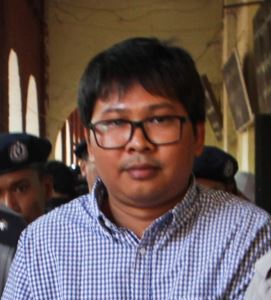
Wa Lone is a Reuters journalist and children's author who, with fellow reporter Kyaw Soe Oo, was arrested on 12 December 2017 in Myanmar because of their investigation into the Inn Din massacre. A police witness testified that their arrest was a case of entrapment. It is believed to have been intended to intimidate journalists.

General elections were held in Myanmar on 8 November 2020. Voting occurred in all constituencies, excluding seats appointed by or reserved for the military, to elect members to both the upper house- Amyotha Hluttaw and the lower house- Pyithu Hluttaw of the Assembly of the Union, as well as State and Regional Hluttaws (legislatures). Ethnic Affairs Ministers were also elected by their designated electorates on the same day, although only select ethnic minorities in particular states and regions were entitled to vote for them. A total of 1,171 national, state, and regional seats were contested in the election, with polling having taken place in all townships, including areas considered conflict zones and self-administered regions.

A coup d'état in Myanmar began on the morning of 1 February 2021, when democratically elected members of the country's ruling party, the National League for Democracy (NLD), were deposed by the Tatmadaw—Myanmar's military—which then vested power in a stratocracy. Acting president Myint Swe proclaimed a year-long state of emergency and declared power had been transferred to Commander-in-Chief of Defence Services Min Aung Hlaing. It declared the results of the November 2020 general election invalid and stated its intent to hold a new election at the end of the state of emergency. The coup d'état occurred the day before the Parliament of Myanmar was due to swear in the members elected at the 2020 election, thereby preventing this from occurring. President Win Myint and State Counsellor Aung San Suu Kyi were detained, along with ministers, their deputies, and members of Parliament.
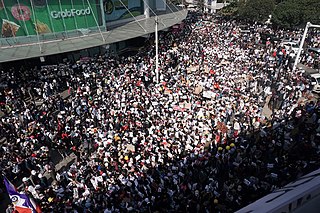
Protests in Myanmar, known locally as the Spring Revolution, began in early 2021 in opposition to the coup d'état on 1 February, staged by Min Aung Hlaing, the commander-in-chief of the country's armed forces, the Tatmadaw. As of 20 January 2022, at least 1,488 protesters and bystanders, of which at least 44 were children, have been killed by military or police forces and at least 8,702 people detained.

General elections are expected to be held in Myanmar, possibly sometime in 2023. Voters will elect representatives to both the Amyotha Hluttaw and the Pyithu Hluttaw of the Assembly of the Union. The elections will be the first after the 2021 coup d'état.